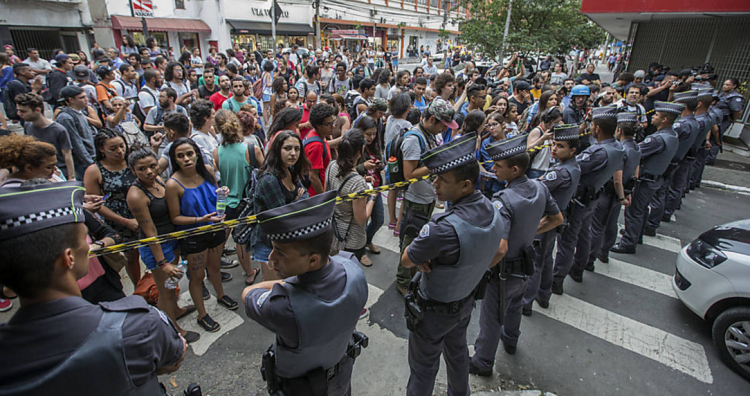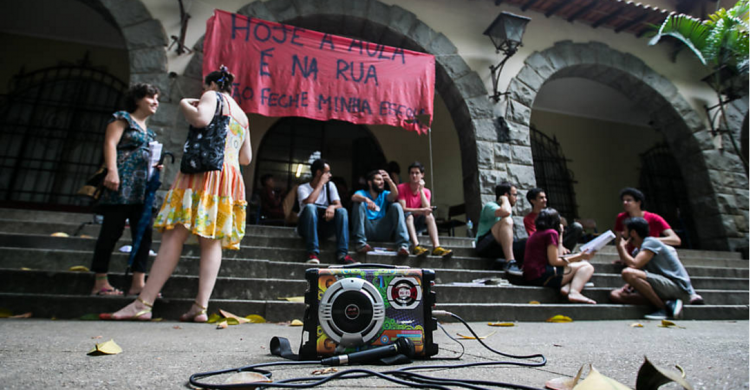With many Brazilian schoolchildren already enjoying their summer holidays, thousands of pupils in São Paulo have been protesting to save their schools from closure. Their efforts have provided a welcome break from the unseemly behaviour of the country’s adult political leaders in Brasília.
By Gill Harris
São Paulo
As the Operation Car Wash investigation into the massive bribery scandal at state run oil company Petrobras rumbles on, impeachment proceedings against President Dilma Rousseff get underway, and Eduardo Cunha, the corruption-dogged speaker of Brazil’s Lower House, has his home searched by police while dressed in his pyjamas, a rather more edifying political movement has taken place in São Paulo.
In early October pupils across the state discovered their schools were to undergo what was described by Governor Geraldo Alckmin as a “restructuring” of the education system, a move that would have entailed the closure of 93 schools and the transferal of over 300,000 pupils. The state government claimed a new system based on ciclos (which roughly translates as year groups) would benefit students’ learning.
Many critics of the reforms suggested that the government’s proposed changes were economically driven and pedagogically flawed: simply an attempt – and a fairly transparent attempt at that – to cut costs.
Either way, São Paulo’s outraged students were not about to take the closures lying down, and around a month later began to occupy the threatened schools. What had begun as just a few students camping out in classrooms swiftly turned into a regional insurgence against the government’s education policy, a movement that spread across social media via the hashtag: #naofechaminhaescola (“Don’t Close My School”).
On November 12, BBC Brasil reported students were camping out in several schools throughout the state, and by the end of the month almost 200 schools had been occupied.
Despite increasing pressure from the politicians and police, who in some cases treated students with truculence and aggression, the youngsters held firm, and last week Alckmin was forced to suspend his plans for reform.
While maintaining the position that the reorganisation would benefit students, Alckmin recognised the need to involve students more directly in any decision made on the matter. “In 2016 we will begin to engage in debate. We will open up dialogues, school by school,” he said. Amidst the backpedalling, state secretary for education Herman Voorwald resigned.
More cynical critics, however, have suggested that the decision to suspend the changes only came after Alckmin’s popularity took a battering. Recent figures released by Datafolha showed approval for the governor had dropped to just 28%, the lowest in his time in office.

In spite of the suspension, however, protests against the restructuring in downtown São Paulo have continued, although the number of occupied schools has fallen to 57, according to the state education department.
Students from Fernão Dias Paes State School in Pinheiros, in the west of São Paulo, one of the schools that initiated the protests, told BBC Brasil they considered the battle to be only half won, while another newspaper report described the students’ belief that the suspension is merely a conciliatory strategy. The protesters are demanding an official statement from the government that the reforms will be dropped permanently from the agenda.
17 year-old Ana Luisa has been occupying two different schools for the past two months: one in outlying São Vicente until the evening, and then another in Praça Roosevelt in the centre of the city, where she spends her nights.
“With all the protesting and travelling I’ve barely had time to eat. I’ve lost three kilos,” she told From Brazil in early December, showing the space around her waistband. “But it’s worth it. Things here have reached a critical moment. We students know we’re making history. And we’re not going to stop until we have official proof from the government that they’re listening to us.”
The demonstrations come at a pivotal moment for the culture of public protest in Brazil. While the massive 2013 marches against political corruption, poor public services and the money spent on last year’s World Cup briefly captured the public imagination, their effectiveness was ultimately diluted by the sheer breadth of demonstrators’ complaints, and despite a vague, panicky government response that made promises of investment in public transport and political reform, few concrete benefits have emerged.
That movement has since been replaced with this year’s anti-government, pro-impeachment rallies, largely middle class affairs where protesters have dwindled in number as the spectre of impeachment has moved closer to reality, while this week saw around 50,000 demonstrators gather in São Paulo to protest against the impeachment campaign, which they describe as a coup. Politicians, meanwhile, have annexed the spirit of as ruas (“the streets”) for their own ends.
Against such a backdrop, and compared with the sordid political capering of the likes of Eduardo Cunha in Brasilia, this youth movement, along with other organic demonstrations such the recent public actions in support of women’s rights, feels refreshingly heartfelt and optimistic.
University professor and state deputy Carlos Giannazi has praised what he calls this “Arab Spring” of student politicisation, while Folha de São Paulo columnist Raquel Rolnik, a professor of architecture and urban planning, has called the movement “the most important political event of the year.”
The mother of one young protester, Rose, meanwhile, told the BBC that the protests were restoring her faith in politics: “it’s a lovely sight to see. These teenagers are taking to the streets to demand better quality education; we’ve never seen anything like it before.”
With growing mistrust in those who run their country, these children are taking their education into their own hands. A similar school occupation movement has begun in the mid-western state of Goiás, where organisers say they have been inspired by events in São Paulo, and a website, www.queronaescola.com.br (“What I Want In School”), posts videos of pupils demanding a more wide-ranging curriculum, school trips, and opportunities to discuss issues such as racism and misogyny.
In São Paulo, meanwhile, the debate as to who rules the school continues. “We might just be kids,” Ana Luisa said, “but I think we could do a better job of it than the adults.”
Editor’s note: On Friday (18th) one student group, the Comando das Escolas em Luta (“Fighting Schools Command”) announced it would end the school occupations, and that it was “time to change tactics”. Other students, however, said they had yet to decide if they would call a halt to their occupations.


